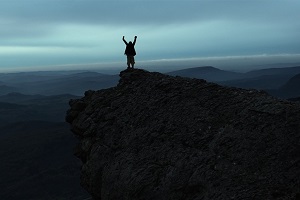Taipei Documentary Film Festival to present 38 films
By Yali Chen In recent years, food safety scandals have become so common in Taiwan, China and many other countries that people are losing confidence in what they eat. People in Taiwan, Japan and many other countries are also questioning the safety of nuclear reactors after the Japanese 3/11 earthquake, tsunami and Fukushima disaster in 2011. Other problems including personal privacy online, land speculation and the decline of traditional family structures have also become widespread. Chang Chao-wei, Cofounder and Chief Producer of CNEX Foundation, said that watching inspiring documentaries can help people face the unknown and potential threats in the future, regaining the power of hope, safety and confidence. Despite this year's theme about transitions and uncertainties in modern societies, the 38 films offer new opportunities and different points of views, thereby bring the healing power to help us have the courage to face the unknown future, said Tien Wei, Deputy Commissioner of the Department of Cultural Affairs (DCA). "Compared with the fictive 'reality' of cinematic films, the 'everyday reality' presented by documentaries often touches your hearts," said Taiwanese actor Bryant Chang, who served as a Festival Ambassador during the 2015 Taipei Documentary Film Festival and also recommended two documentaries – At 60 Km/h and The Backward Class. The Backward Class is a feature film about the students of Shanti Bhavan residential school in Bangalore, India, who imagine a future that defies their "untouchable" caste. The film, which follows students through their final make-or-break year, is directed by UBC (University of British Columbia) graduate Madeleine Grant, who volunteered at the children's experimental school, Shanti Bhavan, in rural southern India seven years ago. The non-profit, private school was established to educate members of the dalit caste, made up of the poorest of the poor in the country. Dalit students in the film were aspiring to be astronauts, doctors and nuclear physicists. Since the movie was made, some have even gone on to work with major international companies, such as Ernst & Young, Goldman Sachs and Mercedes-Benz. And the idea in the film that a good education can change students' futures seems to have resonated with audiences. Last spring, The Backward Class was screened in the Hot Docs Festival in Toronto, ultimately winning the Audience Award. In November 2014, the film received the Can-Am Grand Prix of Cinema Award at the Windsor International Film Festival, and one month later it also won the Documentary Award at the Whistler Film Festival. Block's film 112 Weddings juxtaposes rapturous wedding day flashbacks with remarkably candid present-day interviews to explore timeless themes of love and marital commitment. In addition, Block also follows two couples as they prepare for their weddings – first-timers Heather & Sam, and Janice & Alexander, a duo whose partnership ceremony he filmed 13 years ago, and who are now ready for "a different kind of commitment" after two children and a new-found desire to protect the family that they have lovingly created. The film Bugarach gives a bizarre peek into this small mountain town as the villagers muse upon their newfound celebrity. It follows a handful of characters including a hippie with a fried brain, a young boy who wants to be a magician, and the boy's parents who want to exploit the media presence to launch his son's career. There are also the mayor of Bugarach who both loves and hates the attention, a mad prophet who speaks to the aliens believed to be residing in the mountain, and a handful of elderly ladies who could not care less about the alleged end of the world in this small village. The True Cost is a documentary film exploring the impact of fashion on people and the planet. Filmed in 13 countries, from the brightest runways to the darkest slums of Dhaka, Bangladesh and the cotton fields near Lubbock, Texas, The True Cost is an unprecedented project that invites us on an eye opening journey around the globe and into the lives of the many people and places behind our clothes. It also includes interviews with the world's leading fashion designers including Stella McCartney, Livia Firth, and Vandana Shiva, as well as factory workers and owners, cotton farmers, academic experts on consumption and sustainability, and labor activists. After a break-up with his boyfriend, the fortysomething writer-director David Thorpe embarked on a hilarious and touching journey of self-discovery, confronting his anxiety about "sounding gay." Enlisting acting coaches, linguists, friends, family, celebrities, and total strangers, he soon realized that many people – both gay and straight – often wish for a different voice. More concerned with minor epiphanies than big answers, Thorpe's feature-length documentary – Do I Sound Gay? – explores the existence and accuracy of stereotypes about the speech patterns of gay men and offers a breezy, funny look at gay stereotypes that lead to internalized homophobia. Directed by Du Haibin, A Young Patriot explores passionate patriotism in China's youths born after 1990. The film follows the life experiences of a post-90s young Chinese man, Zhao Changtong, also known as Xiao Zhao, from his senior year in high school all the way to the end of his sophomore year in college. A Young Patriot starts with Zhao as a 19-year-old boy waving China's flag and shouting the slogan, "Long live China! Go China" on the streets of Pingyao, the ancient town in the Shanxi Province. Then it shows Zhao as a college student who encounters an emotional and ideological change as he matures during his awakening of the world and the environment around him. Through his changes, audiences can realize the living conditions of today's young people in China, what they are thinking about, and how they react to the ever-changing environment. Apart from the film screenings, organizers including the Department of Cultural Affairs and CNEX Foundation have also arranged four question-and-answer sessions and lectures on August 30, September 5, September 12, and September 13 to further discuss issues related to this year's theme. For more information on this year's festival and tickets, please go to the website at https://www.facebook.com/cnextw (in Chinese version).
STAFF WRITER Now in its third year, the 2015 Taipei Documentary Film Festival is slated to present 38 films at the Huashan Spot Theater in Taipei from September 18 through September 27. As this year's theme centers on transitions and uncertainties in contemporary societies, the festival features documentaries depicting stories of people who have struggled from desperate situations. Meanwhile, some documentaries have already won prizes in international documentary film contests and more than 20 films will premiere at the festival in Taiwan.
Now in its third year, the 2015 Taipei Documentary Film Festival is slated to present 38 films at the Huashan Spot Theater in Taipei from September 18 through September 27. As this year's theme centers on transitions and uncertainties in contemporary societies, the festival features documentaries depicting stories of people who have struggled from desperate situations. Meanwhile, some documentaries have already won prizes in international documentary film contests and more than 20 films will premiere at the festival in Taiwan. At 60 Km/h is a documentary about the dream of a Uruguayan named Mario Sabah and his two sons: Traveling the world in a Citroen Méhari at a max speed of 60 kilometers (37 miles) per hour. The Citroen Méhari is a lightweight all-terrain vehicle: 600 cc, two-cylinder and 28 HP, with a maximum speed of 60 kilometers per hour. Divorced and lonely, Mario decided to realize a longtime dream for his 50th birthday by driving his car to tour the world. So he quit his job and fixed up the blue Méhari that once served as the family wagon. Together with a camera and his two sons, he then embarked on a 150,000-kilometer (93,000-mile) journey across 45 countries and five continents.
At 60 Km/h is a documentary about the dream of a Uruguayan named Mario Sabah and his two sons: Traveling the world in a Citroen Méhari at a max speed of 60 kilometers (37 miles) per hour. The Citroen Méhari is a lightweight all-terrain vehicle: 600 cc, two-cylinder and 28 HP, with a maximum speed of 60 kilometers per hour. Divorced and lonely, Mario decided to realize a longtime dream for his 50th birthday by driving his car to tour the world. So he quit his job and fixed up the blue Méhari that once served as the family wagon. Together with a camera and his two sons, he then embarked on a 150,000-kilometer (93,000-mile) journey across 45 countries and five continents. Over the past two decades, acclaimed documentary filmmaker Doug Block has supported his career with a side business of videotaping weddings. He decided to track down and interview some of his favorite couples to see how their marriages turned out in his documentary – 112 Weddings. The result is an insightful and often funny portrait of the state of marriage and their relationships.
Over the past two decades, acclaimed documentary filmmaker Doug Block has supported his career with a side business of videotaping weddings. He decided to track down and interview some of his favorite couples to see how their marriages turned out in his documentary – 112 Weddings. The result is an insightful and often funny portrait of the state of marriage and their relationships. Bugarach, a small village in France, was said to be the only place on the planet to survive as the Apocalypse hit. Why 200-odd French people of this village were reported to be the chosen survivors of the Mayan prophecy is a mystery that Bugarach unfolds.
Bugarach, a small village in France, was said to be the only place on the planet to survive as the Apocalypse hit. Why 200-odd French people of this village were reported to be the chosen survivors of the Mayan prophecy is a mystery that Bugarach unfolds.

![Taiwan.gov.tw [ open a new window]](/images/egov.png)
